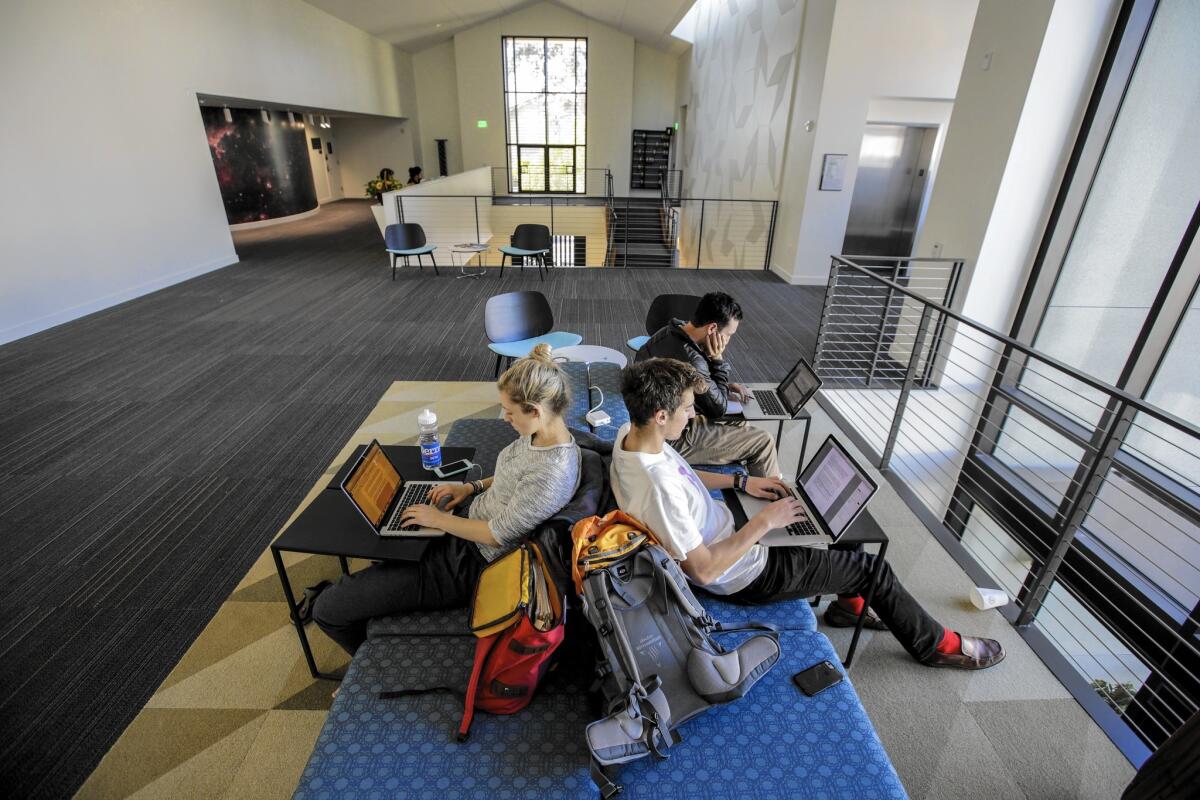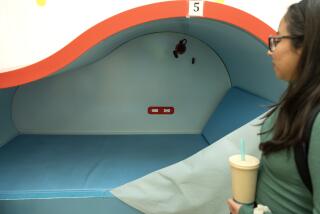Colleges offer massages, snacks and more to help stressed-out freshmen prepare for their first finals

Just before winter break, Kristina Reed began to feel a bit off. She developed a sore throat and cough. The Pomona College freshman was fatigued and lethargic. She had all the signs of flu.
Then she realized it was no coincidence that she was about to take her first college finals.
“My stress levels were pretty high and I think it was related,” said Reed, 18, a neuroscience major. “It’s a big jump up from high school, where they expect you to memorize information and repeat it back. In college it’s a lot more analysis, they demand more from you and especially the level of writing is a lot higher.”
As final exams reach their peak this week across the country, freshmen like Reed are coping with the anxiety and sleepless nights before their first college-level end of term tests. Getting through finals can be grueling for even the most experienced upper-division student. With exams counting for a large portion of the final grade, doing well is a high-stakes proposition.
Freshmen are surrounded by hundreds of other students just as stressed. With tensions ratcheted, some students can go off the rails, such as an extreme example a few years ago when a 20-year-old Harvard student called in a false bomb threat to avoid an exam.
First-year students face the extra panic of the unknown and expectations that far outstrip their high school experience. They may need more mentoring from older peers and faculty to negotiate the process and that is especially true for those who are the first in their family to attend college and who may be less prepared for college life, educators say.
In recent studies, college students report they are under more stress than ever — and that anxiety is a main culprit for their academic struggles. Only about half of incoming freshmen reported a high level of emotional health, the lowest rate ever, according to a recent study. The number of students who said they were frequently depressed rose from 6% in 2009 to 9.5%, according to an annual survey of more than 153,000 freshmen by UCLA’s Higher Education Research Institute.
Some level of stress may be beneficial in focusing attention to the task at hand — such as an exam, said Nicole Weekes, a professor of neuroscience at Pomona College whose field of study is stress, especially in exam situations. But the ability to manage emotions is usually hardest for freshmen.
“If stress gets out of control, if it gets too high, it’s hardest for first-year students and particularly for first-generation students to find perspective about the stress,” said Weekes, who mentors a group of first-generation freshmen focused on science, technology, engineering and math fields.
As an exercise this semester, Weekes had her group try to take themselves out of the immediate experience to imagine their end-goal dreams of becoming an artist or physician.
“I tell my first-year students that this is as hard as it will be, every time you do this it will get easier, not the materials, but you’ll know what to predict and that in itself is so important,” Weekes said.
Pomona College biology professor Daniel Martínez said it’s hard to assess just how much his introduction-to-genetics students — all freshmen — suffer during exams. The difficult course is the first biology class they take at the private, highly-ranked liberal arts college.
“It’s part of the process of growing and we push them,” Martínez said. “By the time they finish this course, they will have developed a set of skills in the courses to come. By the end of their fourth year, they’ll be better thinkers and problem solvers.”
Recognition of the pressure that students are under has grown as colleges’ ability to improve graduation rates and close achievement gaps come under increasing scrutiny. Freshmen are especially vulnerable to dropping out, with a large urban campus losing as many as 20% before the sophomore year, said William Watkins, vice president of student affairs at Cal State Northridge.
Freshmen must navigate a road map of challenges, including registering, paying tuition, keeping up with assignments and budgeting resources as well as nervousness over exams. Success usually comes with maturity.
“I think as students mature from the first year and move beyond 18 or 19 and get to 20 and 21, the development curve begins to bend in a different direction,” Watkins said. “Students are a lot more independent. A junior has probably found other ways to reduce stress. Their skill set is more evolved than is the case for a freshman.”
Colleges are attempting to do more to help, though, with stress-reducing activities such as massage therapy and yoga to soothe psyches. Wide-eyed freshmen can usually be relied upon to take advantage of the aid, often more so than upper-division students, many school officials said.
The Northridge campus last week offered students free breakfast as well as pens, green books, scan cards and other materials needed for exams, attracting a line of takers in front of the student union.
“My stress levels are through the roof,” said freshman Anita Parker, 20, a nursing major who stopped to grab some fruit and minibuns on her way to a biology exam. “It’s such an adjustment from high school, because you have to push yourself, there’s no one helping you.”
Jaezon Johnson, juggling coffee and muffins, said he took many Advanced Placement and honors classes in high school, but admits he wasn’t prepared for his first finals. The transition to college for the 18-year-old, including living on his own off-campus and being responsible for paying bills, distracted from his studies, he said.
“Next semester, I’m going to go to study sessions and seek out more help; my priorities are going to be better,” Johnson said.
First-year USC student Brandon Le, meanwhile, said he was only moderately stressed and didn’t “pull out his hair” over his first college finals. The 18-year-old business major said he benefited from attending a demanding international high school in Taipei.
Study materials passed along from some of his upperclassmen friends also helped, and his all-freshmen dorm went all out providing students with cookies, ice cream and even the chance to snuggle with pug dogs.
The USC marching band stopped by at 10 p.m. during finals week to play fight songs – although it urged students to beat finals rather than the opposing team.
Twitter: @carlariveralat
More to Read
Start your day right
Sign up for Essential California for news, features and recommendations from the L.A. Times and beyond in your inbox six days a week.
You may occasionally receive promotional content from the Los Angeles Times.







